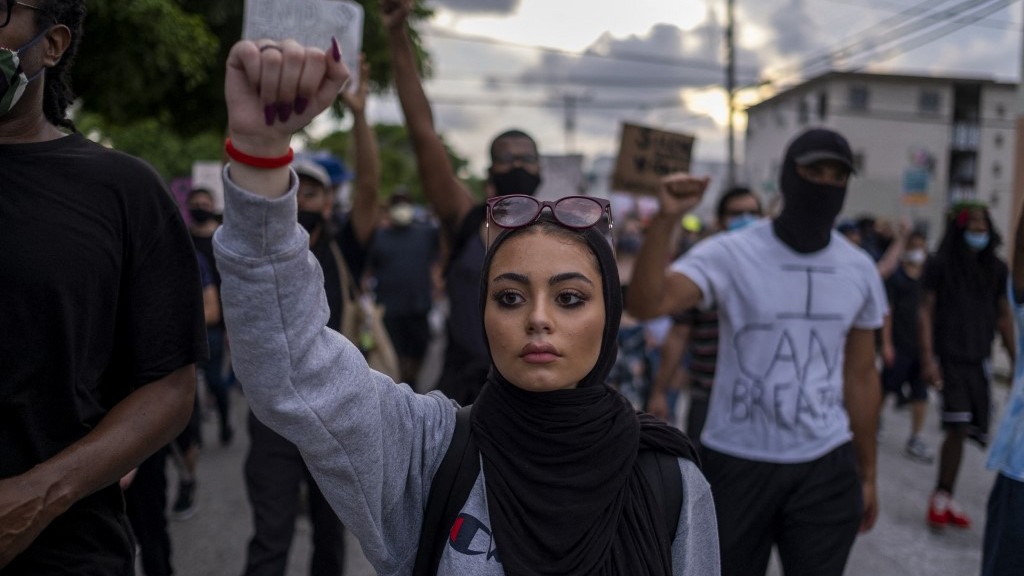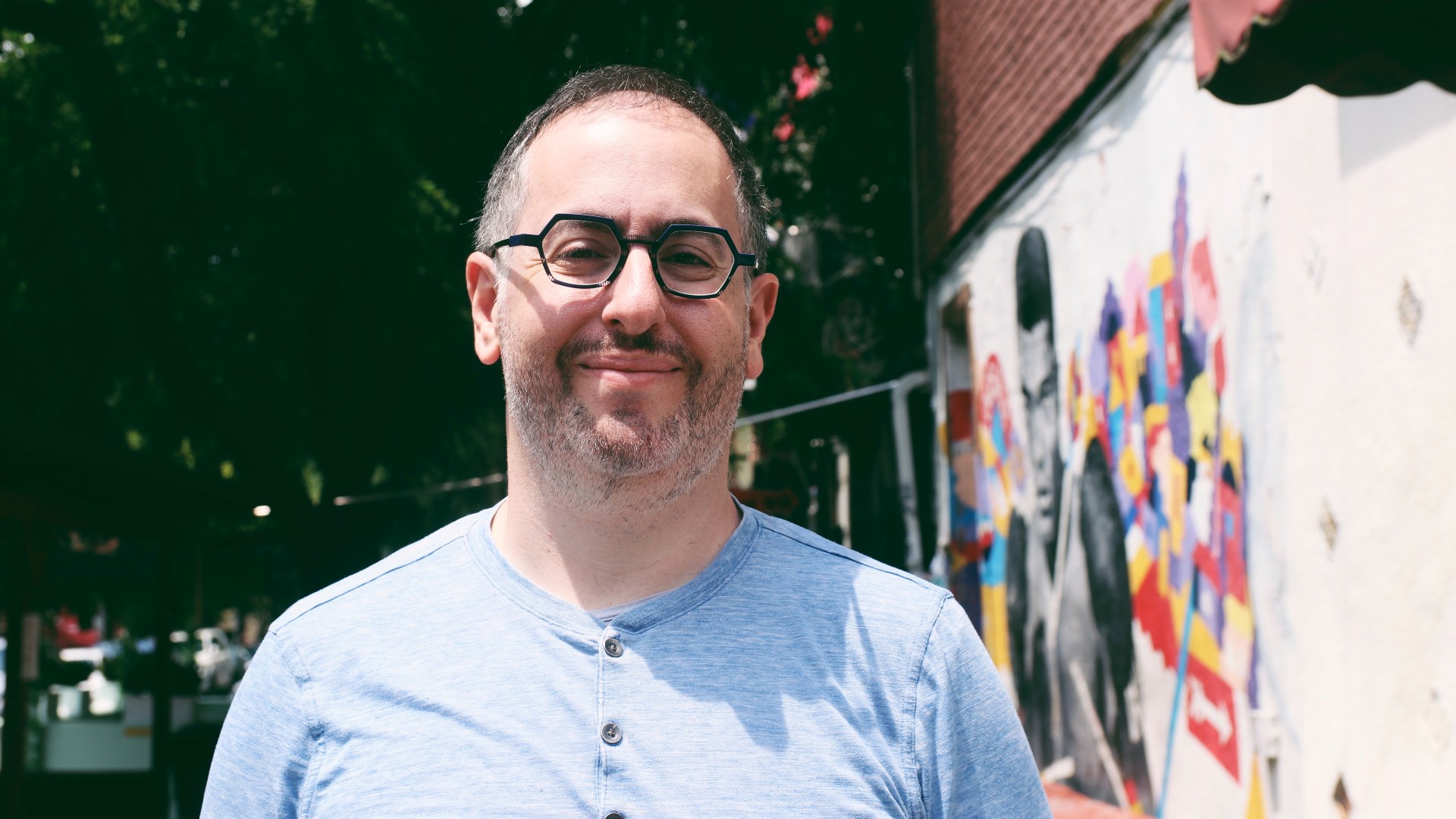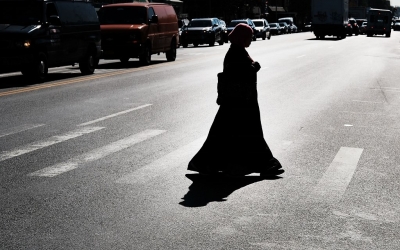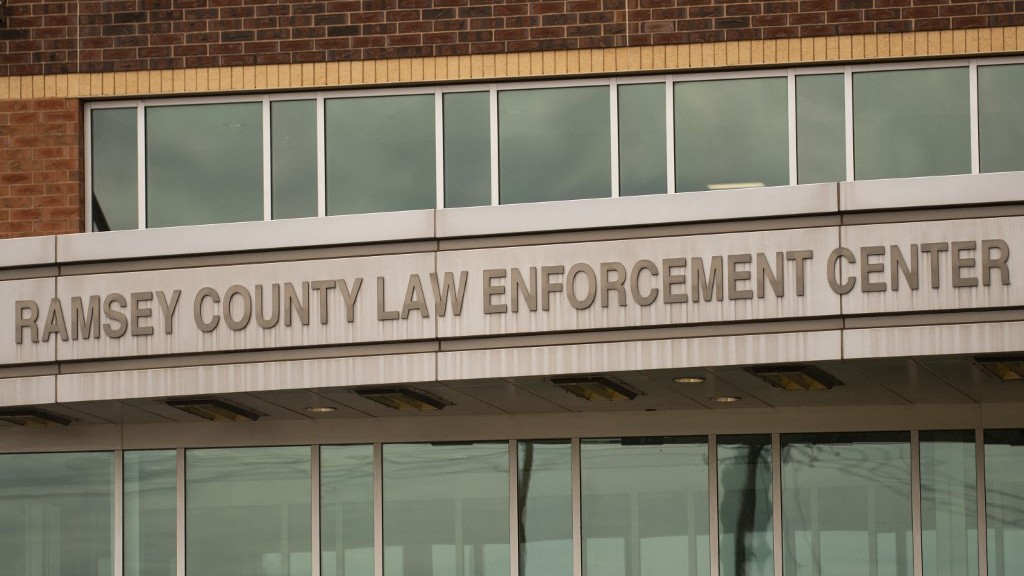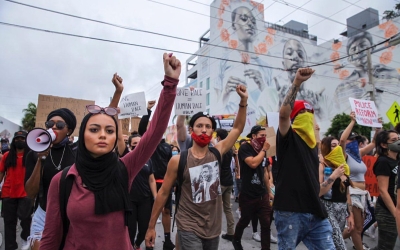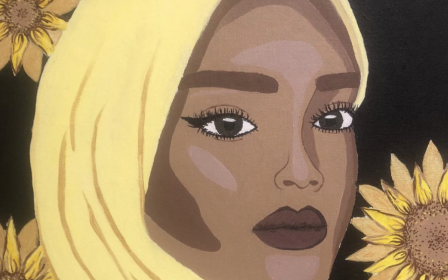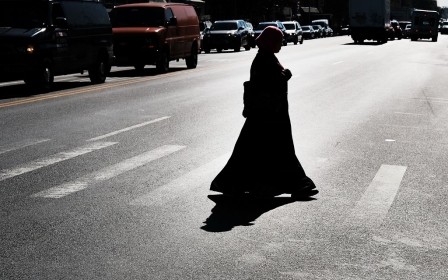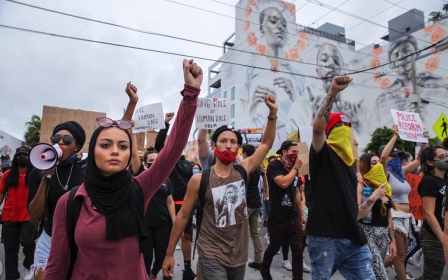'The hijab is mine': Muslim women take back their rights from US law enforcement
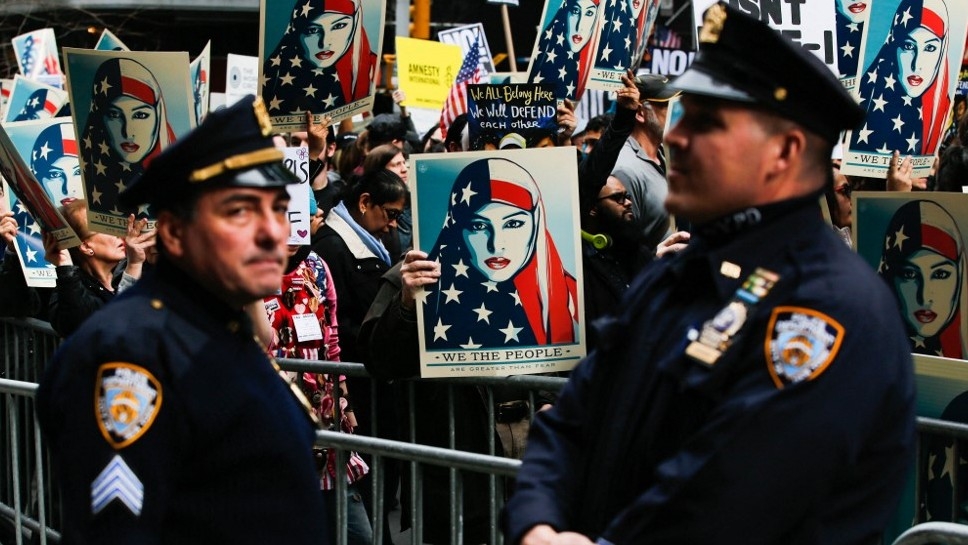
Alaa Massri was just 18 years old when she was arrested.
It was the summer of 2020. Hundreds of thousands of people across the United States were protesting against the murder of George Floyd, an unarmed Black man who was killed while being arrested for allegedly using a counterfeit bill.
Massri helped organise some of the protests in Miami, Florida. She proudly wore her hijab - as she had for the past 12 years - grabbed a megaphone, marched, and demanded justice.
More than 10,000 people were arrested during the George Floyd protests condemning racism and police brutality across the US - and Massri was one of them.
But what set Massri's arrest apart from the others was that she was asked to remove her hijab for the booking photo. Massri explained to officers that the head covering was a religious obligation and that she would not take it off. But no one listened. Instead, an officer yanked the hijab off her head and the photo was taken.
Now Massri’s hijab-less picture was out in cyberspace. The hair she had carefully hidden from the world began circulating on social media, with people and spam accounts harassing her. Some even tried to sell the mugshot for thousands of dollars.
“I felt naked. I felt completely stripped of all control,” Massri told Middle East Eye while recalling what she felt at that moment. "I felt so blatantly disrespected."
“[The hijab] is my protection. This is something I cherish, and to have it just ripped and yanked off with no regard or respect? It felt like all my power was gone.”
Massri’s story is just one of many. There are no federal laws to protect a woman's right to continue wearing a hijab when arrested, and no laws to prevent officers from removing it or asking for it to be removed.
Considered to be obligatory in Islam, the hijab is a head covering worn by Muslim women who choose to wear it. It can be a symbol of modesty and privacy or cultural identity deeply rooted in Islamic traditions. Many wear it around men who are not considered their "mahram" - a male family member with whom marriage is considered unlawful. Therefore, if asked to be removed in front of strangers, it is a violation of their religious and civic rights.
“It was not just this piece of fabric that covered my hair. It was a symbol of my devotion to my religion. It was a symbol of my devotion to understanding that beauty wasn't just physical and materialistic. To have that stripped from you was something almost unbearable, "Massri said.
Every state in the US has its own policy in dealing with religious coverings during arrests. After Massri’s arrest, over 330,000 people signed a petition denouncing her treatment by the county corrections department.
In a statement to The Miami Herald in response to the criticism of its handling of the case, the department said it could “accommodate inmates who wear head coverings for religious reasons” and noted that it was reviewing the matter “to ensure compliance with our policies”.
'Oftentimes Islam is viewed through a lens of suspicion'
- Albert Fox Cahn, lawyer
Massri said she is sure something clicked because five months after her arrest, she got a call from a friend at the county jail. He told her he was with a Muslim hijab-wearing woman who had just been arrested. He told her that they did not take off her hijab.
“I'm grateful that I was able to fight back enough to where something good came out of it,” Massri said.
And in November of the same year, two Muslim women won their own battles over the issue in New York City.
A 'systematic violation'
In 2017, Jamilla Clark and Arwa Aziz were arrested. Both were arrested six months apart but faced the same ordeal. They were asked to remove their hijabs for their booking photos. Surrounded by men, they both said no. Then, they relented.
In 2018, they got together and filed a class-action civil rights lawsuit arguing that the New York Police Department’s (NYPD) “policies for photographing arrestees violate the religious rights of any civilian forced to remove religious head coverings that leave the face unobstructed. It could apply to the hijab of a Muslim, the skullcap or wig of an Orthodox Jew or the turban of a Sikh”.
In 2020, in an effort to settle the lawsuit, the NYPD agreed to change its policy and allow religious observers to be photographed in head coverings so long as their faces were left unobstructed. Under the terms of the settlement agreement, the NYPD was to revise its patrol guide to reflect the new policy and train officers.
'The hijab is my freedom'
- Aida Shyef al-Kadi
The settlement stated that exceptions could occur during contraband or weapons inspections, or if an officer perceives that the headgear poses a threat to the safety of others.
Albert Fox Cahn is a lawyer who represents Clark and Aziz. While the police department changed its policy, he says the women are still fighting to seek damages to hold the NYPD accountable for past violations.
“When we see a large dollar figure attached to this systematic violation of the First Amendment, it will make other police departments think twice about policies that force removal of religious wear,” Cahn told Middle East Eye.
In 2017, the city of Long Beach, California, agreed to pay $85,000 to settle a federal lawsuit filed by a Muslim woman whose hijab was pulled off by a male officer while she was in police custody.
Her lawsuit, filed in 2016, prompted the Long Beach Police Department to reverse its policy barring people from wearing religious head coverings.
In February 2018, the NYPD settled a case filed by three Muslim women for separate incidents concerning the forcible removal of their hijabs, including during mugshots while in custody.
A month later in New York, another Muslim woman settled a fourth case against the department on similar grounds. In total, the department paid out at least $265,000 for the four incidents.
But while there is progress being made in police departments throughout the country, in other parts of the US, women are still being forced to remove their hijabs. Just last month, a Muslim woman from Grand Rapids, Michigan, sued the Kent County Sheriff’s Office because she was forced to remove her hijab for a booking photo.
Cahn explained that there’s an interesting relationship between the criminal justice system and the religious obligations of people.
The First Amendment of the US Consitution protects several basic freedoms in the US, including freedom of religion, freedom of speech, freedom of the press, the right to assemble, and the right to petition the government.
In 1990, a high-profile case, Employment Division v Smith, led to the Supreme Court ruling that the First Amendment does not protect individuals engaging in illegal acts as part of a religious ceremony.
Following the ruling, in 1993 Congress passed the Religious Freedom Restoration Act, which "ensures that interests in religious freedom are protected".
And in 2000, Congress passed the Religious Land Use and Institutionalized Persons Act (RLUIPA), which prohibits the government from imposing a "substantial burden" on prisoners' religious practices unless officials can show a compelling need for the restrictions.
“Prisons have huge amounts of power over those they hold in their custody. What RLUIPA tries to do is make sure that power is not abused in a way to systematically target religious beliefs and practices,” Cahn said.
“Which is why we are able to fight for these women,” he said.
A counterintuitive act
When a person is arrested, a booking photo (or mugshot, colloquially) is taken of them to identify them and keep a record. Women who wear the hijab are generally identified by their hijabs. They wear their hijabs in their driver's license photos, passport photos, and in public when they leave their homes.
So it’s counterintuitive when law enforcement force women to take off their hijabs, Aida Shyef al-Kadi, told Middle East Eye.
'No one else could take it off besides me'
- Alaa Massri
In 2013, Kadi received a traffic citation for driving without her licence. In June of that year, she missed a court date because she said she had to take her daughter to the hospital for an emergency. Soon after, a judge issued a warrant for her arrest.
After she turned herself in, she said the Ramsey County officers told her to take off her hijab and abaya (loose-fitting garment some women wear over their clothes). She said she objected because there were men present. But once she objected, she said she was pushed into a holding cell where she was asked to take her hijab off in front of a male officer.
Kadi said she agreed to remove her hijab for a booking photo after being promised the picture wouldn’t be released to the public. In the meantime, she claimed that the officers gave her a bedsheet and then a T-shirt to use as a hijab. She was kept in her cell for 23 hours for “argumentative behaviour".
The next day, when she was released, she found that her booking photo had become a public record and was available for release upon request. So, she filed a lawsuit, and a settlement was reached.
In 2014, Ramsey County updated its policies to ensure that Muslim women who wear the hijab won’t be forced to remove their head coverings in front of men. The county now offers Muslim women jail-approved headscarves.
As part of the settlement, the county Sheriff’s Office has to train corrections officers on how to offer religious accommodations to those arrested.
The county also agreed to destroy hard and electronic versions of her booking photo. In 2019, Kadi received a $120,000 settlement from the county.
She told Middle East Eye that a lot of people, especially Muslims, questioned her on why she decided to pursue such a long battle. But to her, the answer is simple.
“The hijab is mine. It belongs to me. It’s my freedom. It’s my right. It’s my faith. It's mine,” she said. “I am a Muslim and the only way you can identify me from a non-Muslim is by my hijab. It’s mine and so I fought for it. It was like a war. They wanted to take something that belonged to me just because I made a mistake.”
For Massri, her relationship with the hijab became more complicated. So complicated, that she no longer wears one.
“I felt a lot of guilt for not being strong enough in defending myself. I know it’s jail and I can’t really defend myself. But there was so much guilt. I couldn’t keep it on," she said.
After the protests, Massri went viral on social media. People were stalking her and breaking into her car, and she felt overwhelmed. Every day when she would look in the mirror, she did not recognise herself and she felt like she didn’t deserve to wear the hijab anymore.
“I didn't know who that girl was looking back at me. Every time I’d look in the mirror, I would just remember the power they had to take my hijab off,” she said.
For Massri, the hijab was a part of her body. It was not something she felt anyone could control.
“So taking it off myself, I felt like I regained control. And I regained power in the sense that no one else could take it off besides me. It was mine."
Islamophobia in American policing
If removing hijabs for booking photos to identify women is counterintuitive, then why are they asked to do it?
Cahn believes a lot of it has to do with Islamophobia being intertwined with so many aspects of American policing.
He explained that we see such examples in the NYPD, for example, when the department systematically targeted Muslims by surveilling them, othering the community in the process.
In 2011, an Associated Press investigation found that the NYPD religiously profiled and surveilled NYC Muslims in an attempt to find "radicalisation", mapping out communities, conducting video surveillance, recruiting informants, and generating intelligence databases since 2002.
“We see it endemically throughout policing that oftentimes Islam is viewed through a lens of suspicion. We see other cities, and not I'm not talking about just New York City, that have policies that are clearly designed to target Muslim residents and punish them."
Kadi remembers the moment she was asked to take off her hijab. She said she saw so much anger in the officer.
“It felt like they were angry at the sight of my hijab,” she said.
She said she remembers the officer telling her that other Muslim women who get arrested don't care about the hijab. She said she had tried explaining to them that not every woman has to care.
“It felt like they were not accepting of others who are not like them. They couldn’t see America's diversity. They couldn’t see me as somebody.”
Massri believes it’s a power trip. She believes that the officers who take hijabs off want to take pleasure in having that much power.
“It’s about them knowing they can hide behind that badge and nothing will happen to them,” she said.
She explained that in jail, there were no clocks or windows to tell the time of day.
“So they do this on purpose. At the end of the day, it’s just to strip you of your humanity.”
Middle East Eye propose une couverture et une analyse indépendantes et incomparables du Moyen-Orient, de l’Afrique du Nord et d’autres régions du monde. Pour en savoir plus sur la reprise de ce contenu et les frais qui s’appliquent, veuillez remplir ce formulaire [en anglais]. Pour en savoir plus sur MEE, cliquez ici [en anglais].


